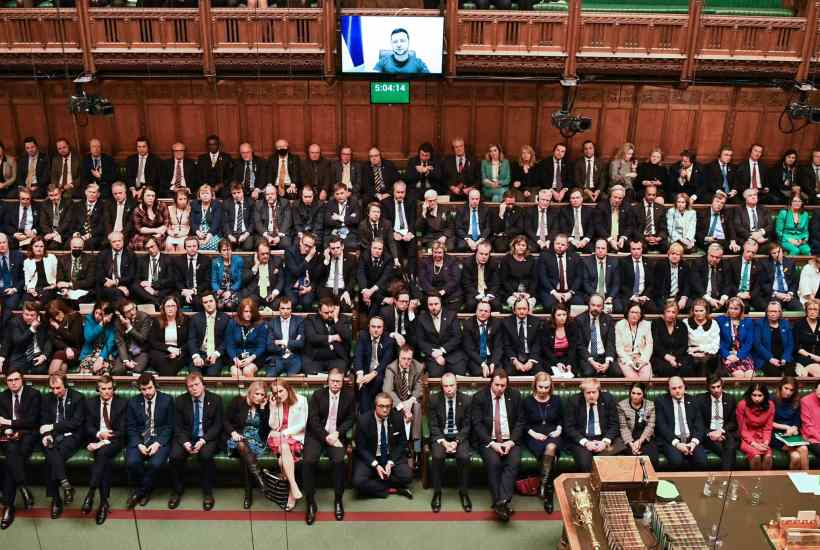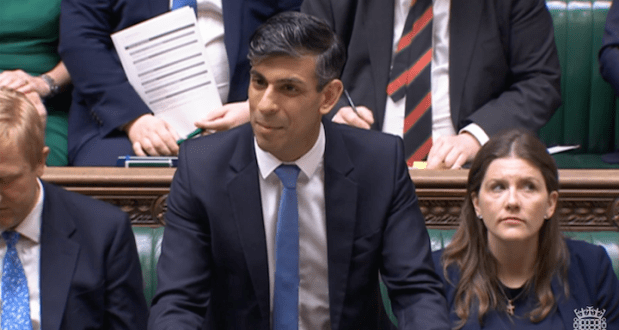This afternoon, the Ukrainian President Volodymyr Zelensky addressed the House of Commons. A single flat-screen TV broadcast his speech to a packed chamber.
Zelensky appeared in plain green fatigues next to Ukraine’s blue-and-yellow flag. He looked pale, tired, fearless and determined. Squads of foreign killers are roaming his homeland trying to find him.
His words were spoken in English by a translator who probably had no advance sight of the text. The halting, ungrammatical phrases made the address strangely powerful.
‘I would like to tell you about the 13 days of war. The war that we did not start.’ Zelensky’s goal is simple. ‘We do not want to lose what is ours.’ And he compared his struggle with Britain’s fight to the death against Germany.
The invasion took Ukraine by surprise. Cruise missiles rained down in the middle of the night: ’Everybody woke up. Since then we have not been sleeping. We have all been fighting for our country with our armies.’
Artillery attacks followed. Columns of tanks rolled in. Ukraine fought back.
‘Our armies showed us who we are,’ he said. When Russians were taken prisoner they were treated well. ‘We remained humane even on day four of this terrible war.’
On day five, the shelling spread to hospitals. ‘Even churches were getting destroyed.’ Children were dying too. ‘That didn’t break us.’
On the tenth day, Nato met. He was disappointed that the alliance had failed to impose a no-fly zone. But his courtesy and tact shone through the eccentric wording of the translator: ’We did feel that unfortunately the alliances don’t work properly always.’
So far 10,000 Russians have died, according to Ukrainian figures. Their number includes a leading general. And this inspires Zelensky to believe in ultimate victory, and in a judicial reckoning when peace returns.
‘That give us hope that there will be some kind of responsibility for those people in front of the court.’ The enemy has military strength. His people have a greater asset – honour.
He didn’t identify Putin by name but he denounced Russia as a ‘terrorist state’ whose actions have already caused the deaths of 50 children. As he put it, ‘These are the children that could have lived.’
Zelensky has a theatrical background and he revived Hamlet’s famous question, ‘to be or not to be?’ On behalf of Ukraine he said, ‘I can give you a definite answer. It is definitely, yes. To be.’
He quoted Churchill’s best known wartime speech, ‘we will fight on the beaches’, and adapted its geography to the forests and rivers of his native land. He finished with a summary of aggression’s impact on a determined people. ‘Ukraine was not looking to have this war, not looking to have become big, but we have become big over the days of this war.’
He thanked Boris in person and asked for tighter sanctions to be applied at speed. A tough response, he said, ‘is stipulated by the greatness of your country’.
His short oration lasted barely ten minutes but he extended the lexicon of patriotic rhetoric with a series of stirring phrases delivered in quiet, undramatic tones.
‘Our armies showed us who we are,’ is a motto that belongs on flags and on coinage, on the doors of palaces, on the tombs of the fallen.
The assassins hunting Zelensky are powerless to do anything but magnify his reputation by ending his life. Today the Commons watched as a man became a myth via Zoom.
Got something to add? Join the discussion and comment below.
Get 10 issues for just $10
Subscribe to The Spectator Australia today for the next 10 magazine issues, plus full online access, for just $10.



















Comments
Don't miss out
Join the conversation with other Spectator Australia readers. Subscribe to leave a comment.
SUBSCRIBEAlready a subscriber? Log in